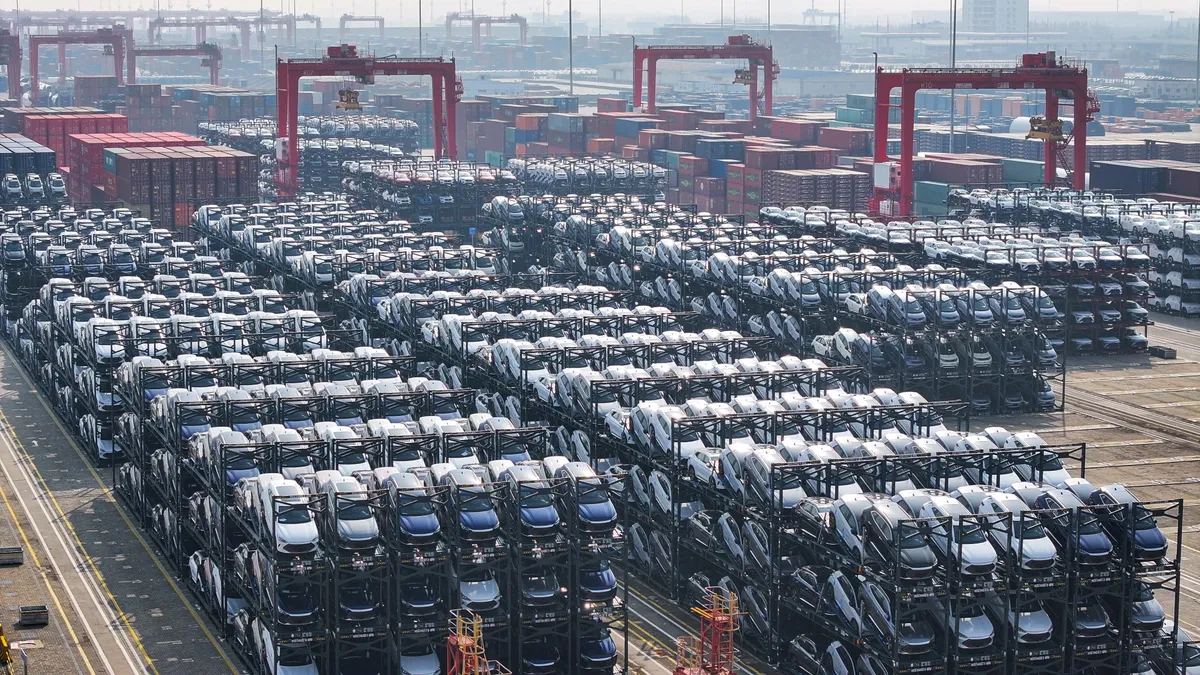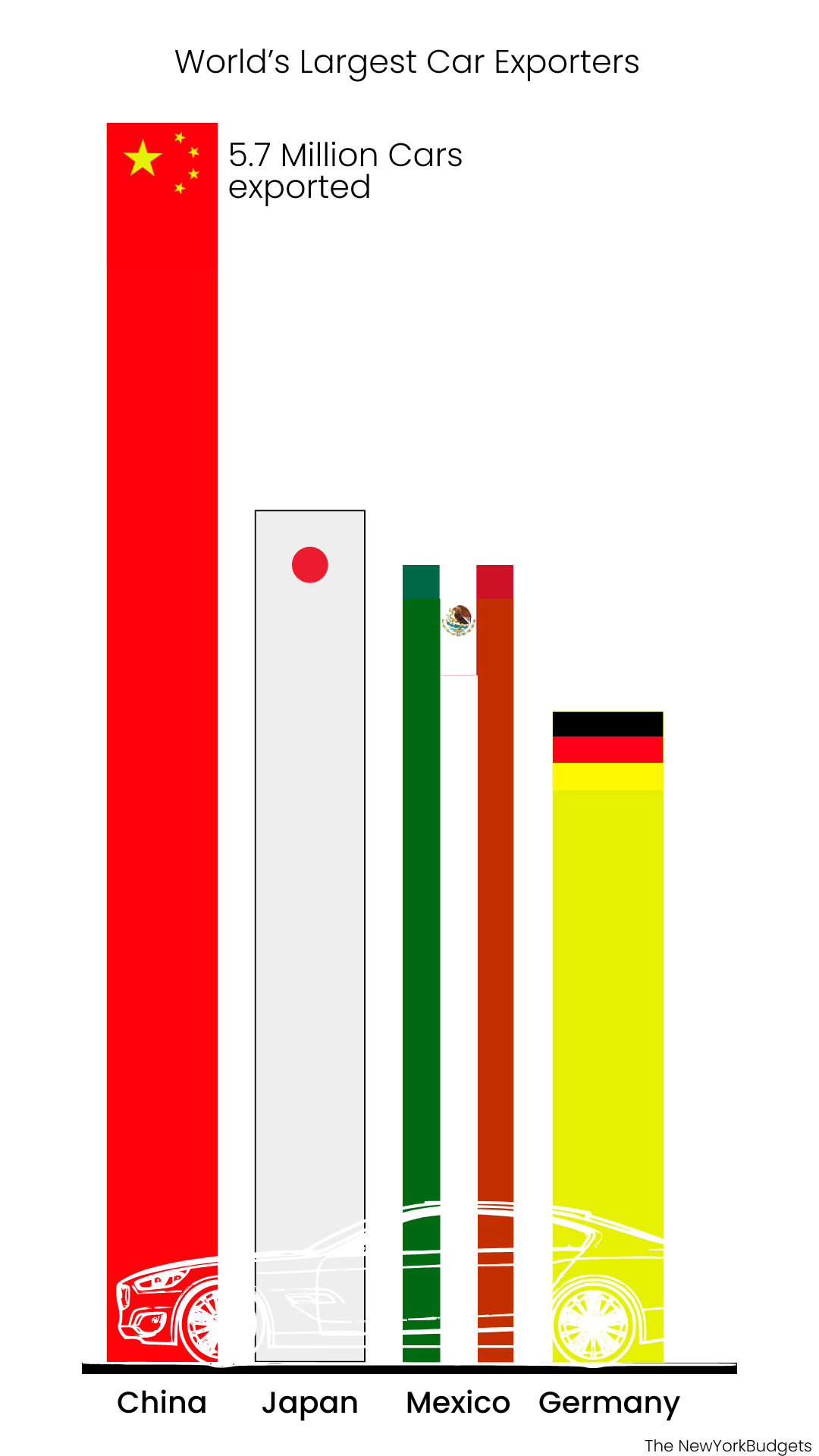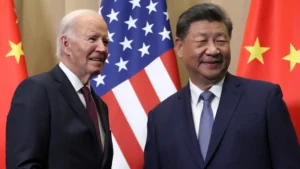In a historic shift within the global automotive industry, China recently surpassed Japan to become the world’s largest car exporter. This milestone highlights the rapid transformation of China’s automotive sector, which has evolved from producing cheap, domestic vehicles to manufacturing advanced, high-quality cars for global markets. The rise of China’s car exports is a complex story driven by strategic government policies, innovation in electric vehicles (EVs), and an aggressive push into international markets.
By Ryan McNom and Harlet Jonson | Nov. 29, 2024 Updated 08:16 a.m. ET
Source: Export data from U.N. Comtrade; data includes new and used passenger cars for fewer than ten people, excluding diesel cars.
China’s automotive industry began with modest roots in the 1980s, primarily focused on producing low-cost vehicles for domestic consumption. Initially, many Chinese automakers relied on joint ventures with foreign car companies like Volkswagen, General Motors, and Toyota, gaining access to technology and manufacturing expertise. These partnerships helped China build its industrial base but left it largely dependent on foreign designs and technologies.
Over the past two decades, Chinese automakers began investing heavily in research and development (R&D), transitioning from imitators to innovators. Companies such as BYD, Geely, and Great Wall Motors emerged as key players, developing homegrown technologies, particularly in EVs. This shift allowed China to gain a competitive edge in a rapidly changing global market that increasingly values sustainability and innovation.
The Electric Vehicle Revolution
A major factor in China’s automotive success is its dominance in the electric vehicle market. China is the world’s largest producer and consumer of EVs, accounting for more than half of global EV sales in 2022. Chinese EV makers like BYD, NIO, and Xpeng have achieved remarkable success by offering high-quality, affordable electric cars equipped with cutting-edge technology.
China’s focus on EVs aligns with its government’s ambitious climate goals. The Chinese government has provided significant subsidies and tax incentives to EV manufacturers, invested in charging infrastructure, and implemented strict emission standards that encourage the transition from internal combustion engine vehicles to electric models.
Moreover, Chinese automakers benefit from a vertically integrated supply chain, as the country controls much of the global production of lithium, cobalt, and other critical minerals used in EV batteries. This allows Chinese companies to produce EVs at lower costs and scale production more efficiently than their competitors.
Strategic Government Support
China’s rise as a car export powerhouse has been supported by its government through industrial policies that promote technological innovation, market expansion, and global competitiveness. The “Made in China 2025” initiative, launched in 2015, designated the automotive industry as a key sector for growth. The government provided subsidies, tax breaks, and funding to bolster domestic automakers, particularly those focusing on EVs.
In addition to financial support, China has implemented policies to attract global talent and enhance technical expertise in the automotive sector. State-backed research institutions and partnerships between automakers and universities have further driven innovation in design, manufacturing, and autonomous driving technologies.
Expansion into Global Markets
China’s carmakers have aggressively pursued international markets, targeting regions where they can compete on price, technology, and quality. Key markets include:
- Europe: Chinese automakers have made significant inroads in Europe, where demand for EVs is surging due to strict environmental regulations. BYD, MG (a brand owned by China’s SAIC Motor), and other Chinese companies have launched EVs in Europe at competitive prices, undercutting established brands like Tesla and Volkswagen.
- Developing Countries: In regions such as Africa, South America, and Southeast Asia, Chinese automakers have capitalized on the demand for affordable cars. These markets often lack stringent emission standards, allowing Chinese companies to export internal combustion engine vehicles alongside EVs.
- Middle East and Central Asia: Chinese automakers have also targeted markets in the Middle East and Central Asia, offering both commercial vehicles and passenger cars. Partnerships with local distributors and governments have helped solidify their presence.
- Russia: Western sanctions on Russia following the Ukraine invasion have created opportunities for Chinese automakers to fill the void left by exiting Western car manufacturers. Brands like Chery and Great Wall Motors have increased exports to Russia significantly.
Overcoming Challenges
China’s dominance in car exports has not come without challenges. Global skepticism about Chinese brands, concerns over intellectual property theft, and geopolitical tensions have posed obstacles. Additionally, Chinese automakers must navigate complex regulatory environments and consumer preferences in diverse markets.
To address these challenges, Chinese companies have invested in branding and quality improvement. For example, automakers have hired international designers, partnered with global tech companies, and focused on after-sales services to build trust among consumers.
China’s Export Numbers
In 2022, China exported over 3.2 million vehicles, a significant jump from just 1 million in 2012. This growth has continued into 2023, with China overtaking Japan in the first half of the year to claim the top spot. Key contributors to this growth include EVs, which made up nearly 25% of China’s total vehicle exports in 2022.
Top destinations for Chinese car exports include Europe, the Middle East, and Southeast Asia. The rising popularity of Chinese EVs in Europe, coupled with strong sales of affordable combustion vehicles in developing countries, has helped solidify China’s position as the world’s largest car exporter.
Global Implications

Agence France-Presse — Getty Images
China’s ascent as the leading car exporter has significant implications for the global automotive industry. Established players like Japan, Germany, and the United States face increasing competition from Chinese brands, particularly in the EV market. Chinese automakers are setting the benchmark for affordability and technological innovation, forcing traditional carmakers to adapt or risk losing market share.
Moreover, China’s dominance in EVs has accelerated the global transition to sustainable transportation. By producing affordable electric cars, China is making EVs accessible to a broader range of consumers, driving adoption worldwide.
China’s emergence as the world’s largest car exporter is the result of decades of strategic investment, innovation, and market expansion. With its dominance in EVs, a vertically integrated supply chain, and robust government support, China has positioned itself as a leader in the global automotive industry. As Chinese automakers continue to grow their presence in international markets, they are reshaping the competitive landscape and setting new standards for the future of transportation.










Be First to Comment